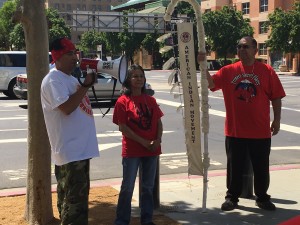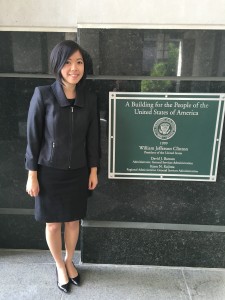Defending the Medicine Lake Highlands from Industrial Geothermal Development

The Environmental Law Clinic was back in court this week to continue our clients’ efforts to save tribal lands from industrial geothermal development. Surrounded by tribal members and environmental advocates, the District Court Judge indicated that he will grant the Clinic’s motion for summary judgment, invalidating 26 geothermal energy leases on sacred tribal lands.
The geothermal leases are located in the Medicine Lake Highlands, a place of profound spiritual significance for countless generations of Native Americans. For thousands of years, the Pit River Tribe and other Native Americans have used the lake and surrounding Highlands for spiritual guidance, religious ceremonies, and traditional doctoring practices. Today, the Highlands are part of the National Forest system, allowing the larger public to experience the unique beauty of the region. All of these activities are threatened, however, by industrial-scale geothermal energy development on 26 federal leases issued to private companies by the Bureau of Land Management (“BLM”).
Geothermal development involves significant surface disturbance, including the construction and operation of roads, wells, pipelines, powerlines, and powerplants. These impacts would significantly degrade the value of the cultural sites to the Pit River Tribe. Despite these harmful effects, BLM approved the original 10-year geothermal leases in the 1980’s after only cursory environmental review and without any tribal consultation. In 1998, BLM continued the leases for up to 40 years, even though the leases have neither produced geothermal steam nor been proved capable of producing steam.

Environmental Law Clinic student Mari Takemoto-Chock (JD ’17) argued that BLM violated the Geothermal Steam Act when it continued the leases for 40 years. Under the terms of the Act, BLM can only grant a 40-year lease continuation to a lease that has either produced steam or has been deemed capable of producing steam in commercial quantities. 30 U.S.C. §§ 1005 (a), (d). Because none of the leases at issue contains a well that has or will produce steam in commercial quantities, the Judge indicated that he will set aside the 40-year lease continuations.
“I’m happy we were able to knock out the lease continuations,” Ms. Takemoto-Chock said, reflecting on her experience. “This land is sacred to our clients, and the possibility of industrial development has been hanging over the land for decades. I’m hopeful that in any future decision concerning these lands, the tribe’s voice will be heard.”
Read the briefs, written by Debbie Sivas, Alicia Thesing, and students Mari Takemoto-Chock (JD ’17), Mary Rock (JD ’17), Michelle Wu (JD ’17), and Madeleine McKenna (JD’ 16) here.
